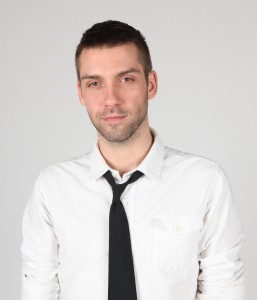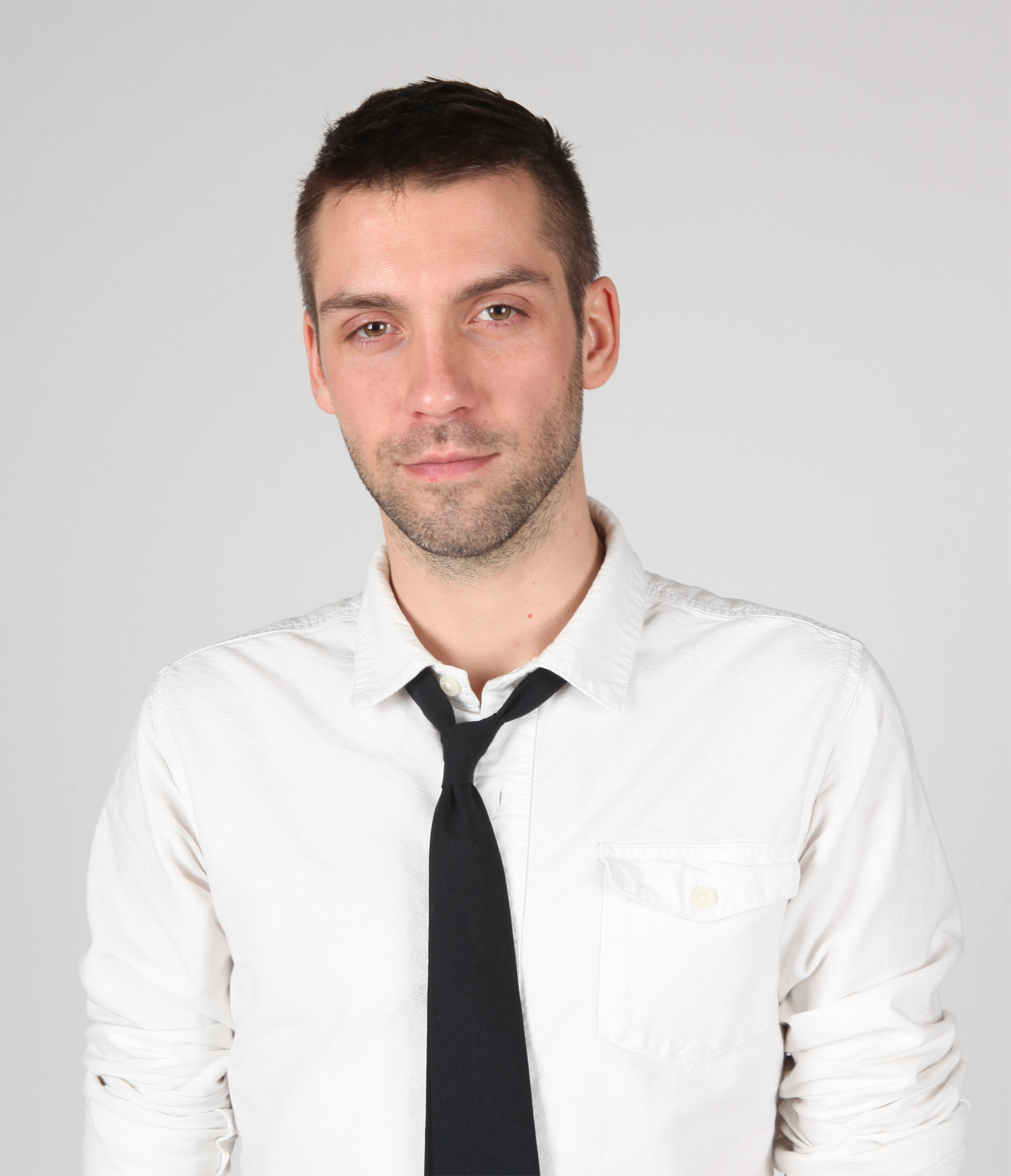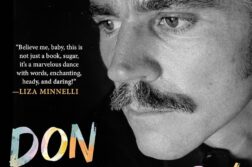RYAN CONRAD is an artist, activist, and scholar whose politics challenge what he sees as assimilationist tendencies in the mainstream GLBT movement. He’s also the co-founder of Against Equality (AE), a collective of GLBT activists, and editor of their recently published book, Against Equality: Queer Revolution, Not Mere Inclusion. Conrad has contributed to scholarly and activist publications such as American Quarterly, Socialism & Democracy, In These Times, and Fifth Estate, and his artwork has been exhibited in Europe, Asia, and North America.
 Speaking on behalf of the five-member group, Conrad describes it as a collective that’s “committed to undermining a stunted conception of equality.” Rather than seek inclusion in institutions that they see as classist, racist, patriarchal, and heterosexist—the military, the institution of marriage, and the prison system—Against Equality seeks to challenge the current GLBT movement’s status quo by providing a clearinghouse for alternative viewpoints. What unites their analysis is a discourse that’s unapologetically anti-capitalist, anti-imperialist, and anti-patriarchal. The book Against Equality is a compilation of three previous anthologies, each of which focuses on one of the three issues that they regard as the sacred cows of contemporary gay politics: gay marriage, gays in the military, and hate crimes legislation.
Speaking on behalf of the five-member group, Conrad describes it as a collective that’s “committed to undermining a stunted conception of equality.” Rather than seek inclusion in institutions that they see as classist, racist, patriarchal, and heterosexist—the military, the institution of marriage, and the prison system—Against Equality seeks to challenge the current GLBT movement’s status quo by providing a clearinghouse for alternative viewpoints. What unites their analysis is a discourse that’s unapologetically anti-capitalist, anti-imperialist, and anti-patriarchal. The book Against Equality is a compilation of three previous anthologies, each of which focuses on one of the three issues that they regard as the sacred cows of contemporary gay politics: gay marriage, gays in the military, and hate crimes legislation.
The GLR caught up with Ryan Conrad while he was on a book and lecture tour of Australia and New Zealand. The following interview was conducted on-line in early March 2015.
— JF
Gay & Lesbian Review: The name “Against Equality” seems to be a provocation. We assume you mean this in some special sense. Can you explain in what sense you’re “against” equality?
Ryan Conrad: The name “Against Equality,” as well as our “>” (greater than) logo, demands that we do better than claim an equal stake in deeply inequitable cultural and civic institutions and that we instead demand something better, more just. It’s a call for reinvigorating the queer political imagination to conjure and actualize a social and economic justice movement that is on our own terms and not simply the reactionary demand of inclusion, especially when inclusion means reifying deadly institutions that maldistribute life chances like marriage, military, and prisons.
GLR: Thus the problem with these institutions is precisely that they promote inequality. So what you’re really saying is that you oppose “equality” as defined (co-opted?) by the Human Rights Campaign and other mainstream organizations, no?
RC: What we are saying is that the entire framework of equality, as espoused by mainstream gay and lesbian rights organizations, as well as the single-issue campaigns it gives rise to, is meaningless because it lacks an economic and intersectional analysis. Speaking in vague ideological terms about “equality” avoids actually talking about the deep inequity inherent in the institutions the HRC and others so desperately want to access.
GLR: Can you talk a little about the collective itself—who you are, how you’re organized, and what you’re trying to achieve?
RC: As a collective we organize non-hierarchically and with a consensus-based decision-making model. The five of us are based throughout the U.S. and Canada, and we strike a good balance of gender, racial, and non-urban difference among our members. But to be clear, we are not an organization in that we don’t have an office, a phone, a budget, an internship/ volunteer coordinator, etc. We are first and foremost an archival project, maintaining an online archive of critical textual and visual work. To activate this archival material, we’ve done a number of publications, cultural projects, and speaking engagements.
GLR: Of the three issues that you’ve focused on in past publications, same-sex marriage seems to stick most in your craw. In the general introduction to the book, you home in on the Windsor case, in which the Supreme Court overturned DOMA. It was brought by a wealthy lesbian after the death of her partner, and you contend that it was another case of a rich person asserting her privileged status. What troubles you about the push for same-sex marriage?
RC: The argument for or against gay marriage is a distraction from actually addressing the structural inequalities implicit in marriage where conjugal couples benefit from a myriad of privileges (1,138 as outlined by the U.S. General Accounting Office in the Defense of Marriage Act) while all other articulations of family and care are penalized. The fervor over the Windsor case demonstrates the level of distraction going on here. What we want is a fully funded social safety net in this country that includes health care, public education, public transportation, access to healthy food, employment opportunities, etc. We will never get these things if our social movements are organized around giving wealthy people, gay or straight, tax breaks on their amassed wealth.
GLR: Chances are the Supreme Court will rule on marriage bans across the USA this June. What outcome are you hoping for?
RC: This summer, when the Supreme Court ushers in a new era of gay marriage bliss for the marrying kind, it will be in some ways a sigh of relief. To be honest, many of us are burned out on this fight draining any and all energy from other battles, from the impacts of austerity on HIV/AIDS service organizations and queer and trans youth organizations, to disproportionate trans incarceration and poverty among our queer and trans communities. Gay marriage will soon be the law of the land, but never in my lifetime will we see universal health care, a well-funded and comprehensive social safety net, or an end to mass incarceration.
GLR: In addition to gay marriage, the book – and your website – focuses on two other issues: the right of LGBT people to serve in the military and the U.S. prison system. Why have you chosen to focus on these three themes?
RC: Inclusion in marriage, military service, and state protections through hate crime legislation have become the cornerstones of gay and lesbian politics over the last three decades. AE focuses on these three themes because they are the defining gay and lesbian political motifs of our era, and we hope to offer a corrective to the assumed consensus that inclusion in these institutions is a worthy goal for a broader queer and trans social and economic justice movement. There is no place for the privileging of one family form to the detriment of others, the imperial and genocidal force that is the U.S. military, or the racist and anti-poor prison industrial complex in any queer future I could imagine fighting for, let alone inhabiting.
GLR: One rap on Against Equality is that it offers a lot of criticism of contemporary society and especially certain institutions but doesn’t offer many alternatives. Is this a fair criticism? I found myself agreeing with the basic analysis of many of the essays but disagreeing with some of the conclusions that were reached. For example, although I agreed with much of the analysis of the prison-industrial complex in a piece by Dean Spade, his solution is to abolish the entire prison system. And it’s probably true that sexual violence is over-criminalized in the U.S., but this writer seems to advocate that we stop prosecuting all acts of sexual violence. Isn’t there a danger of throwing the baby out with the bathwater?
RC: Against Equality offers a lot of criticism of reactionary contemporary gay and lesbian politics without being prescriptive as to what is to be done instead, although a lot can easily be inferred from our archive or individual collective members’ activism in their home communities (e.g., queer and trans inclusive universal health care, guaranteed minimum income, massive immigration reform, affordable housing, ending the school-to-prison pipeline, supporting queer and trans young people, etc.). It’s important to remember that Against Equality is not an organization, nor is it a movement. We are merely an archive, and I try to be really humble about what we are doing as a collective and what role we play in the broader social and economic justice movements. That being said, I think our archive has been influential to some degree in opening up space for more people to have discussions about what kind of political work can and should be prioritized to benefit the greatest number of queer and trans people. Plus, a vanguardist professional political elite from the gay and lesbian non-profit industrial complex dictating the priorities of a group of people is something we rally against and is a top-down model we aren’t looking to recreate.
GLR: Can we talk about the intellectual roots of your thinking and that of the collective? In the book’s introduction you describe Against Equality as an “anti-capitalist collective,” which suggests a Marxist orientation, while your publisher, AK Press, is known as an anarchist house. Can you offer some background in this area?
RC: A key point of unity among our collective members is that we are all anti-capitalists and all align with feminist, anti-racist, and anti-imperialist ideals. Politically, we all fall somewhere along the anarchist–socialist spectrum, but none of us find it particularly useful to belabor our very small ideological differences when we have so much work to do and share such fertile ground in which to work together.
GLR: There seems to be a utopian strain as well, a desire to tear down the edifice of modern capitalist society and start all over.
RC: Labeling our work as utopian isn’t really all that interesting though. What radical political project isn’t? Or why would you shoot for anything less? Additionally, how are the economic fanatics that believe the free hand of the market will meet our social needs any less utopian? I’d like to think we are much more pragmatic than capitalists that believe in such ideological buffoonery. So yes, surely we fight for the best possible world for all people, I guess that just makes us paradoxically “practical utopians” or perhaps what Judith Butler has called “provisional anarchism.”
GLR: What kind of response have you received, both to the book and to the talks you’ve been giving in various parts of the world?
RC: Over the last five years, members of Against Equality have given talks about our work in the UK, Australia, New Zealand, and across North America. In the early days of touring with our work, the state-by-state gay marriage battles had really just begun in the U.S., and the response to us was extreme, from detailed racist death threats sent by angry gay-identified Facebook users to LGBT alumni campus organizations trying to have our events canceled. These examples really demonstrated how little space there was for having the kind of political discussions we, among others, were demanding at the time. Now, as time has passed and more states have legislated gay marriage, the stakes of having the kinds of political conversations we were having have lowered. Unsurprisingly, we are still completely ignored by mainstream gay and lesbian organizations from the HRC to Lambda Literary, but we’ve accomplished a lot for a small, budgetless project. Internationally, folks are quite receptive to our work and happy to hear a corrective to the singular progress narrative currently exported through various kinds of media by mainstream gay and lesbian organizations.
GLR: Now that the book is out, does AE have any other projects on the front or back burner?
RC: As a collective we are taking stock and reflecting on the last five-plus years of archiving and publishing. We’ve been touring quite relentlessly to support the distribution of nearly 10,000 books since we started publishing in 2010, and it’s rather tiring. We’d really like to do some revisions to our website, perhaps hold a conference, or even work on a book foregrounding the voices of queers from the global south, but right now it seems appropriate to reflect a bit on what we are doing and re-emerge with a fresh vision.
GLR: There’s a semi-famous photo of you which was auctioned off a few years ago that reveals almost all of you, with a book covering the fun bits. Just curious: what was the book?
RC: Different forms of sex work, among other forms of underground economies, have been integral to supporting our self-funded project. We are not a non-profit, in fact we are anti-profit, and this means we don’t have charitable status, apply for grants, or access other forms of institutional funding. After self-publishing our first three books and selling them nearly at cost, not to mention providing them at no cost to incarcerated queer and trans folks, has meant we accrued a significant amount of debt on credit cards over the years. So to deal with this debt we looked to underground economies in addition to the speaker’s fees we charge universities to stabilize our project financially. The photo you are referring to features the second book AE self-published, Against Equality: Don’t Ask to Fight Their Wars, in just the right position.
GLR: How do you find articles for inclusion in the archive, and how can our readers submit something for possible inclusion?
RC: Our archives are largely generated from user-submitted content. People who visit our website are also the people that have submitted a large amount of work we’ve archived. Anyone can e-mail a submission of their published work, and once it’s vetted by the collective, we’ll add it to our on-line archive. We also gather archival material from our very active, but well moderated, Facebook group.
For more information or to submit material to the Archive, visit www.againstequality.org.
Jim Farley is an associate editor of this magazine.





